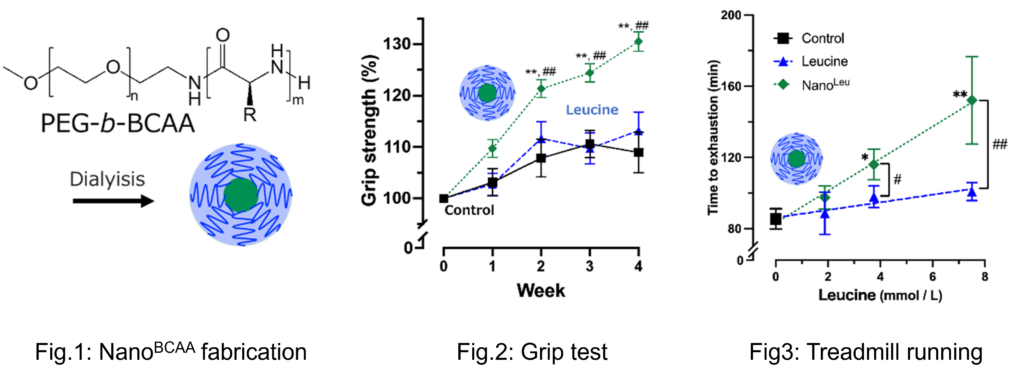Advantage and Core Benefit
- Combination of safety and efficacy proven ingredients and additive.
- Possibly useful for amyotrophic symptoms, such as sarcopenia, frail, cachexia, as well as muscle atrophies, dystrophies.
- Potentially useful for hepatic cirrhosis
Background and Technology
Leucine Isoleucine, and Valine, collectively dubbed “branched chain acid (BCAA)” are known to promote muscle synthesis and have been taken by athletes as supplements. However, its effects are limited probably because BCAA is easily excreted from the body.
To overcome the drawback, the team of researchers has successfully synthesized a prodrug; BCAA peptide and polyethylene glycol block copolymer that forms micelles (NanoBCAA: Fig1). Orally administered NanoBCAA is trapped in the villi of intestine, gradually degraded by intestinal enzymes and releases BCAA.
Small molecule BCAA drug has been commercialized under the brand name LIVACT, indicated for improving hypoalbuminemia associated with hepatic cirrhosis. NanoBCAA is potentially useful for this.
 |
Data
- 20 nm NanoLeu was fabricated, and effects were confirmed in mouse model.
- NanoLeu free drink increased muscle strength (Grip test) over time (Fig.2), running capacity (treadmill running, Fig3) and muscle mass 5 weeks after.
- NanoLeu, not Leu, increased expression of mTOR, muscle growth factor and decreased Foxo3a, degradation factor.
- Similar results obtained by NanoIle, NanoVal
Patent &Publications
Patent: WO/2025/229946.
Partly presented in the Japan Society of DDS, 2024, etc.
Researchers
Dr. Yukio Nagasaki (University of Tsukuba)
Dr. Takuto Toriumi (Shimane University)
Dr. Nobuyuki Morimoto (Shimane University)
Expectations
We are seeking companies who can in-license and commercialize the technology.
Details can be disclosed under CDA.
Samples are available under material transfer agreement.
Project.KJ-05045


